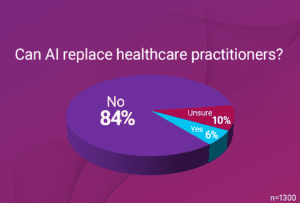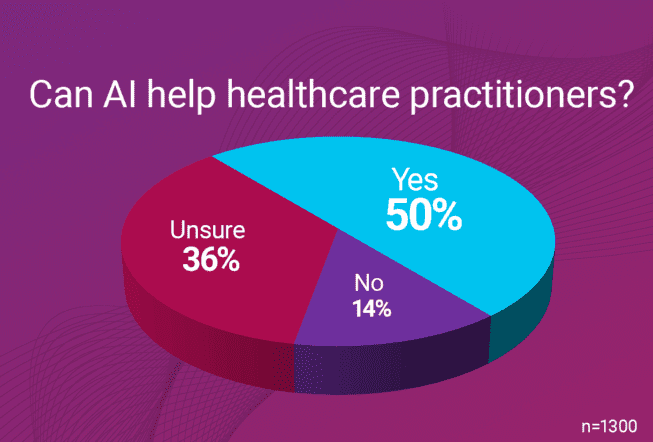
With all the media buzz about AI (Artificial Intelligence) and ChatGPT it made us wonder: is the world ready for robotic doctors and nurses?
In order to find out, we did a small survey, and the results were clear. No, not if consumers and patients have a say in the matter.
My name is Fran Linnane, a Senior Researcher at Wellstar, one of the largest and most integrated healthcare systems in Georgia, and I conduct research in our Catalyst Voice platform as well as other areas. Catalyst Voice is a community where patients, consumers, team members and innovators can share their thoughts and help shape the future of healthcare.
Our research shows that the vast majority of people recognize that AI is not a replacement for healthcare professionals. In fact, 84% of the 1300 consumers who took the survey in March 2023 believed that AI will not replace healthcare providers. However, the survey also revealed a range of opinions on how AI could impact healthcare.

36% of respondents believed AI could help healthcare professionals deliver better care. They recognized that AI has the potential to enhance diagnosis accuracy, treatment planning, and patient monitoring, ultimately leading to improved patient outcomes. These individuals were hopeful about the possibilities that AI could bring to the healthcare industry. This recently published New York Times article features doctors who are already using AI to organize notes and produce paperwork that’s repetitive and time-consuming. On the other hand, 50% of the respondents were not sure about the impact of AI in healthcare. They acknowledged the potential benefits but had concerns about the ethical implications, reliability of AI algorithms, and the potential for job displacement among healthcare professionals.
Lastly, 14% of the respondents were skeptical and did not believe AI would help healthcare professionals. They may have concerns about the limitations of AI, or a preference for traditional healthcare practices without significant reliance on technology.
The survey findings highlight the mixed perceptions about AI in healthcare among consumers. While some are optimistic about AI’s potential as an enabler to the industry, others may have reservations and uncertainties. It is crucial to address these concerns and ensure that AI is integrated into healthcare in an ethical and patient-centric manner, with healthcare professionals playing a pivotal role in interpreting and utilizing AI-generated insights to deliver the best possible care to patients.

In conclusion, while AI has the potential to revolutionize the healthcare industry, it is not viewed as a replacement for healthcare professionals by most consumers. Consumers hope that AI will be a valuable enabler to the industry, enhancing the capabilities of healthcare providers and improving patient care. As the healthcare industry continues to evolve, it is important to strike a balance between leveraging AI for its benefits while upholding the human touch and expertise of healthcare providers in delivering compassionate, holistic, and patient-centric care.

